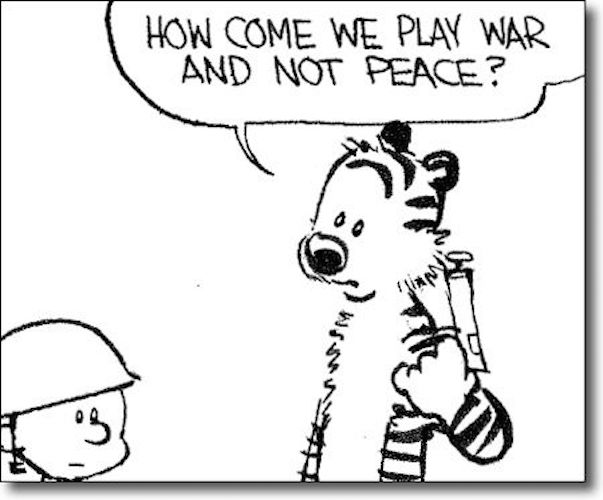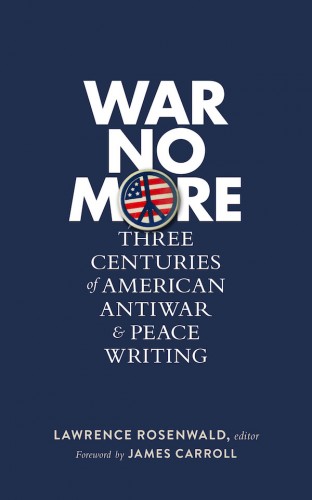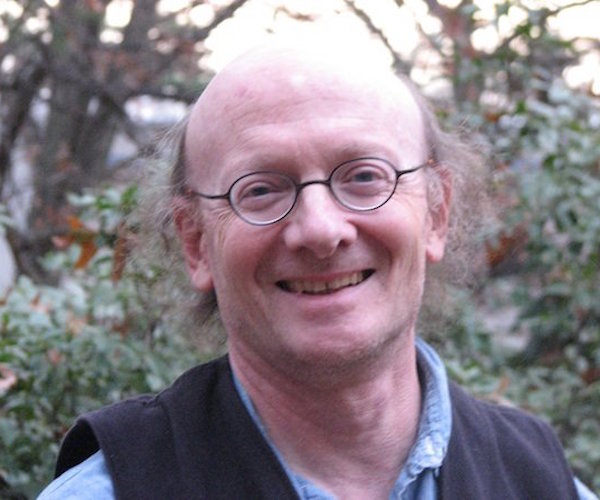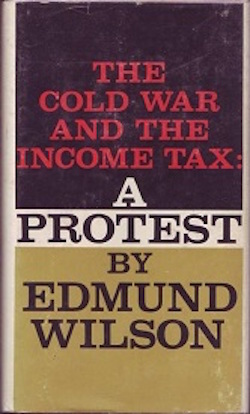Book Interview: Library of America’s “War No More” — Why Not Give Peace a Chance?
The anthology War No More explores a distinctively American tradition of antimilitarism.

A frame from a Calvin and Hobbs’ comic strip “Why Do We Play War and Not Peace?”
By Bill Marx
First, a spirited anti-pacifist note from Theodore Roosevelt, made in a speech he delivered exactly a century ago this month in Kansas City, about a year before America’s entry into World War I.
The professional pacifist is merely the tool of the sensual materialist who has no ideals, whose shriveled soul is wholly absorbed in automobiles, and the movies, and money making, and in the policies of the cash register and the stock ticker, and the life of fatted ease.
Roosevelt connects antiwar sentiment with American materialism, rather than seeing that homegrown antimilitarism is nothing if not idealistic, questioning the notion that war is the price we must inevitably pay for our liberty and prosperity. It is that tradition of vigorous dissent which is explored in Library of America’s anthology War No More: Three Centuries of American Antiwar & Peace Writing (838 pages, $40). The volume gathers together poems, essays, memoirs, letters, leaflets, songs, and speeches from nearly 150 writers/activists — no tools for ‘fatted ease’ in the lot. The chronology covers combat from the Revolution to the war on terror; the selections include the voices of veterans, from the Civil War to the Iraq War, statements of principle from conscientious objectors, and antiwar essays by the usual suspects, Henry David Thoreau, Jane Addams (who Roosevelt critiqued), Thomas Merton, William James, and Kurt Vonnegut.
Lawrence Rosenwald, the editor of the anthology, is the author of Emerson and the Art of the Diary (1988) and Multilingual America: Language and the Making of American Literature (2008). A war tax resister since 1987 and a longtime pacifist, he is the Anne Pierce Rogers Professor of English at Wellesley College. I asked him, via email, a few questions about War No More, from how post-9/11 terrorism presents new challenges to the pacifist movement to the qualities that make for the best antiwar writing.
Arts Fuse: Many on the right and left argue it is an increasingly dangerous world. Pacifism is not a reasonable response to the threats around us, which range from terrorism to Global Warning. Your introduction posits that the volume’s texts “…chronicle …a possible emergence of a new way of thinking about the necessities of human life.” What do you see as the value of publishing War No More now? How will it contribute to the debate over war and peace in the Presidential election and beyond?

Lawrence Rosenwald: Yes, that’s a very good question. I wouldn’t offer pacifism as a comprehensive response to global warming (I wouldn’t offer militarism either). The austerity-and-renunciation-focused strain of pacifism, though, from John Woolman through Juanita Nelson does have something to propose, though: a radical reduction of each individual’s carbon footprint, indeed of each individual’s structure of desire. I remember hearing Juanita say at some war tax resistance gathering, “if the people of the world shared resources equally, each of us would have at most one intercontinental flight in a lifetime.”
Beyond that – well, there’s a general sense among scholars and activists and citizens that terrorism as manifested on and since September 11th, 2001 is something new, which challenges our old ways of thinking and calls for new ones. I agree with that sense. And I don’t think that antiwar activists and theorists have sufficiently developed the new ways of thinking called for, or that readers seeking those new ways of thinking will find them here. But the anthology still matters in this conversation because it critiques one of the old ways of dealing with terrorists, i.e., war; one can admit the challenge posed by terrorism and still argue that war is a bad instrument for combating it. In the view of the contributors who comment on them (and in mine, for what it’s worth), the two American wars since September 11th, in Afghanistan and Iraq, have been unsuccessful in combating terrorism, and are subject to many of the critiques and resistances directed against the wars that preceded them. When in the course of the Presidential campaign some candidate says, and surely some candidate will because some candidate already has, that the way to defeat ISIS is go conduct a traditional war against it, many of the anthology’s arguments will be made acutely relevant.
AF: Talk about your editorial criteria for what you decided to include in this volume. A short note in the Times Literary Supplement pointed out that there not many song lyrics included in this selection. Yet there are many memorable antiwar songs. And there are no cartoons or graphic novels.
Rosenwald: I read that TLS piece, and thought about writing a rejoinder to each of its criticisms, though I was glad to see the book noticed … I’ll take each of your queries in order, though leaving the first and most general one for last.
There are some antiwar song lyrics, though not as many as the TLS writer wanted. One reason is that such lyrics are inert on the page. Phil Ochs’s “I Ain’t Marching Anymore” is an example; I love it, I remember what it was like to hear it when it first came out, and hearing the opening guitar chords, even before the voice enters, sets strong emotions resonating in me. But when I look at the bare lyric on the page, it seems flat.
Cartoons – there is one, actually, the Calvin and Hobbes strip called “Why Do We Play War and Not Peace?.” I love it and have a framed copy on my desk. I looked a lots of antiwar cartoons, I should note. Many of them get their energy from melodramatic, grotesque caricatures of war and soldiers. I don’t find such caricatures very interesting, for the most part; the best antiwar literature takes on soldiers and war advocates at their best.
Graphic novels – I looked at some, but didn’t find any that lent themselves to being represented by brief excerpts.
I’ve implied something about my more general principles of selection in the preceding specific remarks, but should make one additional point, a possibly controversial one. When I was preparing the anthology, I kept having an experience where someone would recommend a text to me, and I would think, Wait, this isn’t really an antiwar text at all! Mostly the texts in questions were realistic, unromanticized narratives of war. Some of them were of high literary quality. But they didn’t seem oppositional to me. I made a few exceptions, of course, not wanting to be dogmatic; Ambrose Bierce’s “Chickamauga” is one such. But the distinction was and is important to me, so much so that eventually I wrote and published an essay about it!

War No More editor Lawrence Rosenwald — “Capaciousness was something I knew I wanted the anthology to have.” Photo: courtesy of the artist.
AF: The volume dramatizes an interesting and ongoing tension between pacifist and antiwar American traditions. For example, Shirley Chisholm proclaims in “The Business of America is War” that “I am not a pacifist. I am deeply, unalterably, opposed to this war in Vietnam.” How troublesome is this split?
Rosenwald: You’re right about the split’s being there. But no, it wasn’t troublesome to me; I knew that both kinds of texts would turn up, and that the anthology would be like one of those antiwar rallies where fundamentalist pacifists and young Maoists join forces to oppose a particular war. Capaciousness was something I knew I wanted the anthology to have.
What sorts of conversations there might be, in this world or the text, among John Woolman, Joseph Smith, Thoreau, Emma Goldman, Abraham Joshua Heschel, and Zack de la Rocha – you’d need a novelist to imagine them, and I hope some novelist undertakes the task.
AF: Much antiwar and peace writing is dismissed by critics because they charge that it is “preaching to the peacenik choir.” How does the best antiwar writing avoid this pitfall?
Rosenwald: In two ways I think. One is vividly set out by William James, in “The Moral Equivalent of War,” in a way in harmony with my previous comments about antiwar cartoons: “Pacifist tho’ I am, I will refuse to speak of the bestial side of the war-regime … and consider only the higher aspects of militaristic sentiment.” That is, engage advocates and arguments for war at their best. The other, more pertinent to literature in a narrower sense – fictions, plays, poems – has to do with honoring Hebbel’s dictum, that in a good play everyone is right. The best antiwar writers in those forms do justice to soldiers and war advocates, do not melodramatize them (and do not put a halo on those opposing war and wars).
AF: How important does political context play in the value of antiwar and peace writing? For example, didn’t it take more courage to denounce the Vietnam or Iraq Wars when they were being planned and executed?
Rosenwald: I agree about the degree of courage required; opposing an ongoing war is hardest and riskiest, a war in preparation second riskiest, a war in retrospect safest.
That said, though, I’d note that the degree of distance in time from the war being opposed matters more generally, and that distance from the war doesn’t mean that there are no political contests being fought, e.g., the current or recent contests over the Vietnam War and the dropping of the atomic bomb, or for that matters the contests over the Confederate flag. We work out new politics by interpreting old wars. (This comes up for me whenever I read Pat Barker’s World War I trilogy.)

AF: Talk about the efficacy of fiction versus non-fiction in the antiwar literary tradition. For example, Howard Zinn credited reading Dalton Trumbo’s novel Johnny Got His Gun (an excerpt is included in the volume) to be a major reason for his turn to pacifism.
Rosenwald: Hmm . . . “Efficacy” is really hard to measure, except in cases where individuals bear witness to it, Zinn talking about Trumbo, or Lew Ayres about Remarque’s All Quiet on the Western Front, which he credited with making him a pacifist during World War II (he starred in the film made from Remarque’s novel). Most of the time we can’t know what the effect of the work is. (This is true of social justice literature as well – we know about The Jungle and The Grapes of Wrath, but who can measure the influence exerted by the autobiographies of Jane Addams and Dorothy Day, who in the future will be able to measure the influence exerted by Ta-Nehisi Coates’s Between the World and Me?) It’s a very mysterious thing, influence.
AF: Are there surprises in this volume, even for those familiar with antiwar writing? [It was a pleasurable shock for me to read literary critic Edmund Wilson denouncing the American war machine here.] Do you have some favorite selections?
Rosenwald: One text that will surprise a good many readers — no non-Mormon I know is familiar with this passage — is the amazing passage from the Book of Mormon, with its implacably precise account of an act of collective nonviolent resistance to war. One more common kind of surprise is the one you note: readers find an author they know, and think to themselves, with “pleasurable shock,” What is he or she doing here? (I myself, by the way, came across the Wilson passage at the first war tax resistance gathering I ever attended, in the early ’80s, and knew from the beginning that I wanted to have something from that remarkable book in the anthology.)
A favorite piece of mine, one I allotted a fair amount of space to, is the remarkable exchange of letters on nonviolence and revolutionary violence between Yvonne Dilling and Mary Jo Bowman. There isn’t anything like it, I’ve loved it since I first read it, and when I assign it in courses, my students love it too.
Bill Marx is the editor-in-chief of The Arts Fuse. For over three decades, he has written about arts and culture for print, broadcast, and online. He has regularly reviewed theater for National Public Radio Station WBUR and The Boston Globe. He created and edited WBUR Online Arts, a cultural webzine that in 2004 won an Online Journalism Award for Specialty Journalism. In 2007 he created The Arts Fuse, an online magazine dedicated to covering arts and culture in Boston and throughout New England.

Kudos for this very helpful interview and the pointer to the new book. Really looking forward to reading it.